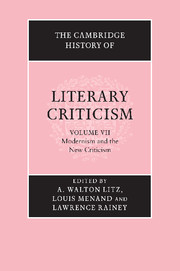8 - I. A. Richards
from THE NEW CRITICS
Published online by Cambridge University Press: 28 March 2008
Summary
The prominence accorded to I. A. Richardsin the present volume is owing in large part to his having pioneered and encouraged the scrupulous, verbally oriented teaching and reading of literature which has been standard practice in English and American secondary schools and colleges since the 1930s. Among academic critics the theoretical aspects of the Richards legacy have been passed along – with some alteration – through the writings of the American New Critics and such related figures as Kenneth Burke, R. P. Blackmur, and Richards's student William Empson. It is only if one emphasises his influence on the anonymous practice of classroom teaching, however, that one realises his full historical importance; and in so doing one brings to the fore his remarkably broad range of interests, which include linguistics, psychology, philosophy, and the theory of education.
Ironically enough from his own point of view, it was just when the influence of his early work on the theory of literary interpretation came most to be felt and admired, in the 1930s and 1940s, that Richards himself turned away from literary issues and diffused his attention across the much broader field of language and communication in general; and while his later work found new readers among such unified field theorists as the Encyclopedists of Unified Science, the General Semanticists, the United World Federalists, and the promoters of Basic English, Richards's original readers among the literary critics, who were devoted to what John Crowe Ransom liked to call the ‘special ontology of the poem’, tended to lose interest.
- Type
- Chapter
- Information
- The Cambridge History of Literary Criticism , pp. 179 - 199Publisher: Cambridge University PressPrint publication year: 2000
References
- 2
- Cited by



